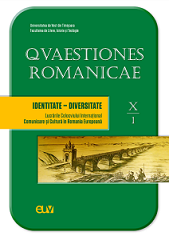Identitate și diversitate în descrierea „ciumei” din Athena (Thucydides 2, 47-54 - Lucretius 6.1138-1286)
Identity and diversity in the description of the "plague" of Athens (Thucydides 2, 47-54 – Lucretius 6.1138-1286)
Author(s): Theodor GeorgescuSubject(s): Ancient World, Other Language Literature, Health and medicine and law, Theory of Literature, Identity of Collectives, Sociology of Literature
Published by: Universitatea de Vest din Timişoara
Keywords: Thucydides; Lucretius; plague; identity; diversity;
Summary/Abstract: One of the most famous episodes in the history of Thucydides' Peloponnesian War is the description of the "plague" of Athens in 430 BC. In the context of the second book, the episode follows and contrasts with the no less famous funeral speech of Pericles. In the description of the disease Thucydides had predecessors: the beginning of Homer's Iliad – the plague that Apollon throws at the Greek camp – and the episode of the plague that seizes Thebes described in Sophocles' Oedipus Tyrannus. Thucydides' "plague" combines medical vocabulary, comparable to technical texts from the Corpus Hippocraticum and Galen, with the author's reflections on the psychological effects of the disease on society. This description served as a model for the Latin poet Lucretius, who, in Book VI of De rerum natura, concludes his explanations of various natural phenomena with the picture of the Athenian plague. In this paper we aim to identify the common elements in the description of the plague, but especially the diverse character of the two descriptions in the specific context of the two works.
Journal: Quaestiones Romanicae
- Issue Year: X/2023
- Issue No: 1
- Page Range: 163-172
- Page Count: 10
- Language: Romanian

